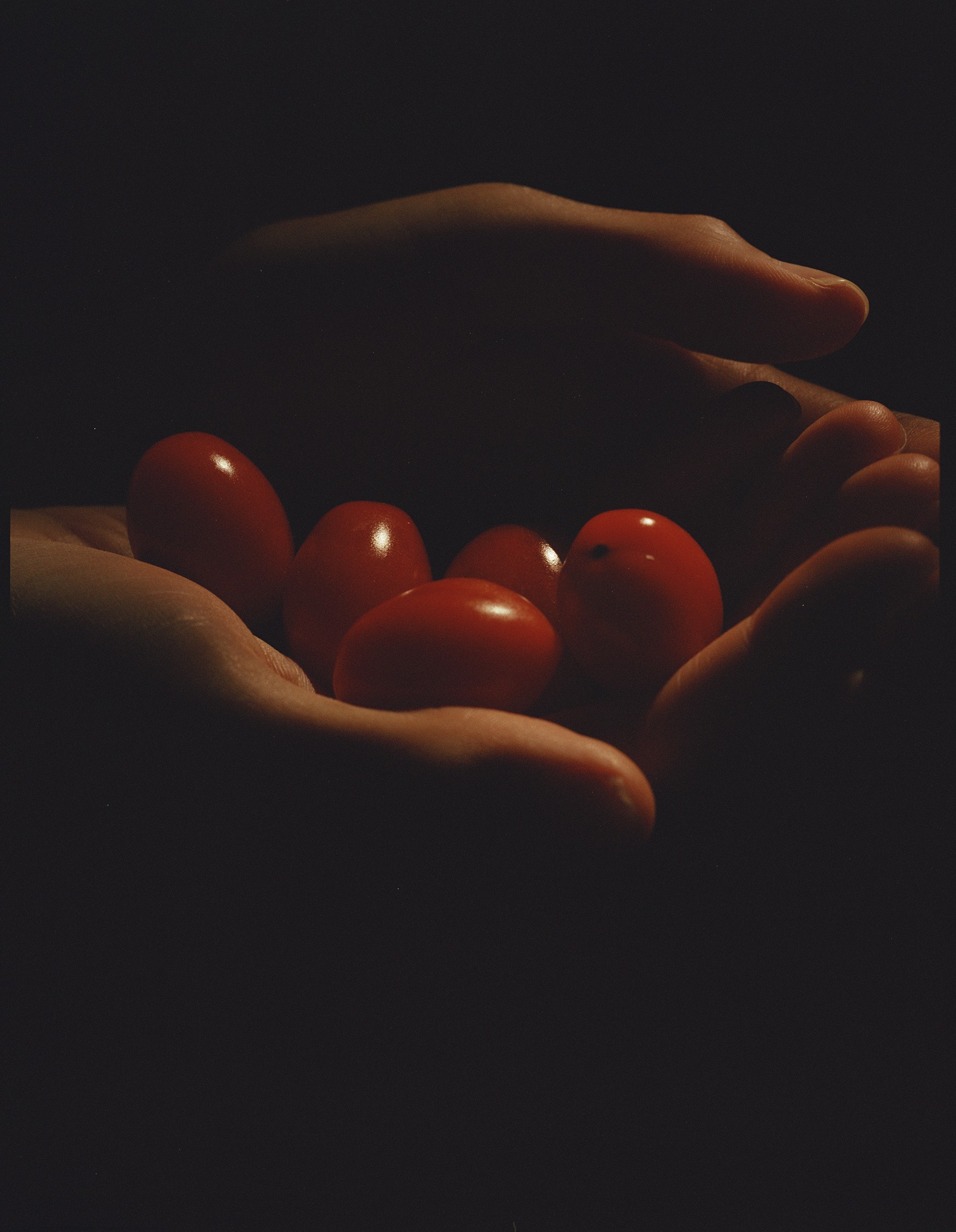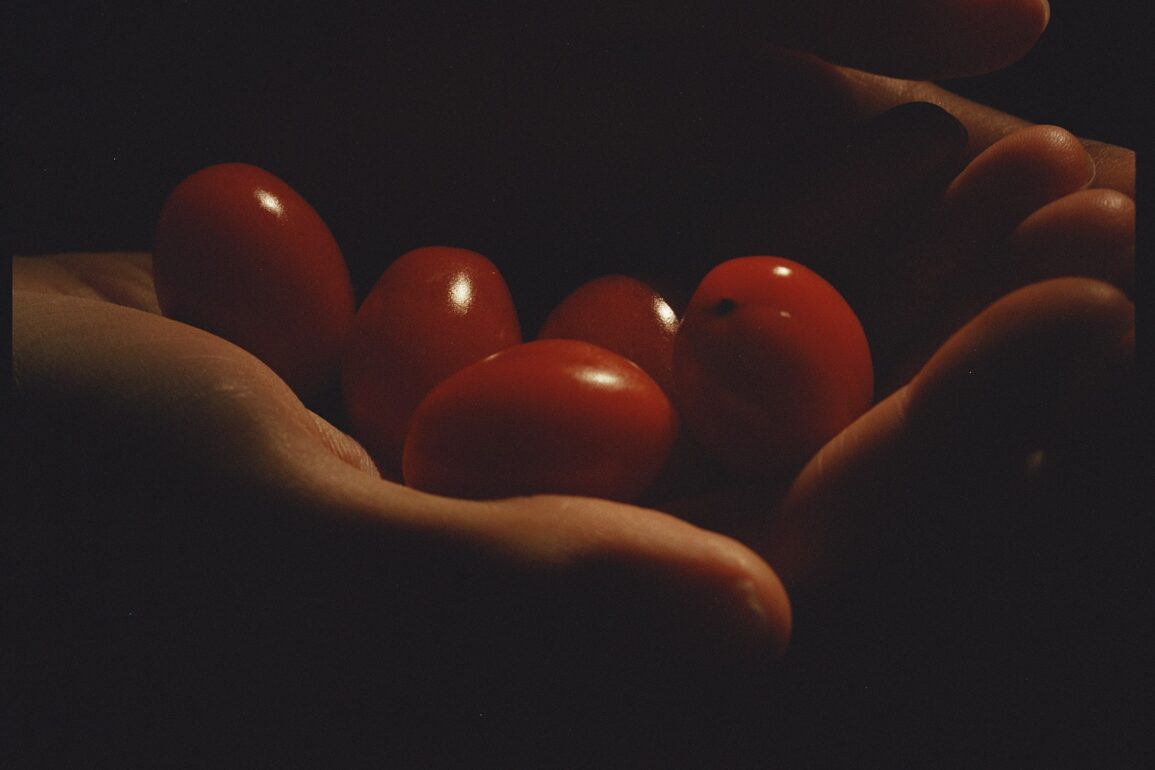
Photograph by Eric Chakeen
Our prison dumped thousands of pounds of food scraps every week—until we did something about it. We repurposed food waste, and we’re reinventing ourselves along the way.
It’s 4 a.m.. Ol’ Bessy has us up before sunrise. She’s got to have her breakfast.
No, Bessy isn’t a baby. She’s a large food-waste processor—one that lives in the back room of our prison’s institutional kitchen.
We affectionately named her “Bessy” because she eats a lot and reminds us of a cow. This morning, a dozen white 55-gallon barrels, partially filled with food scraps from yesterday’s meals, fence her in. This is her hearty breakfast—200 gallons of discarded food weighing just over 1,100 pounds. She will chop up the food into tiny particles and remove excess water and contaminants, reducing the weight by about 65% and the volume by about half. The material comes out of Bessy’s chute looking like coleslaw. Bessy is just the first step in a composting program we originally started at the Washington State Reformatory.
We’ve been composting and worm farming for the past 13 years in collaboration with Evergreen State College’s Sustainability in Prisons Project. At the Reformatory, a crew of 10 of us were able to divert 100% of the prison’s food waste using several unique methods. Our fertilizers have been used on the prison’s vegetable gardens as well as donated to community groups and local municipalities. We were so successful that we were asked to help create an accredited curriculum and vocational certification for other people inside. Still not satisfied, we asked to be transferred to the Washington Corrections Center, about a hundred miles away, to do it all again. But it wasn’t easy getting here.
We are part of a group of incarcerated environmentalists who first got informed, then got inspired, to do something about a little known but significant contributor to climate change: food waste. We spent countless hours writing proposals and bent the ear of every prison official we could reach because doing a project like this inside—despite the hard work and pitiful pay—is considered a privilege. It might seem counterintuitive to some that this program, which saves the prison money and makes it compliant with new laws, would encounter resistance. But not if you consider the dehumanizing lens through which the prison staff see us.
We start each day before dawn, when the prison is just waking up. Our little room is a welcome oasis from the regular chaos and noise. As we switch on the overhead fan and fire up Bessy, a steady hum fills the room, drowning out the hustle and bustle of other workers washing pans and prepping meals.
After a quick stretch, we load Bessy up, and after she gnaws the waste down to a fraction of its original weight, we treat it with specialized microbes and pack it into sealable blue barrels for transport. By 7:30, we wash Bessy and her room until they’re sparkling. We clean, stack, and prepare the waste bins for today’s scraps, and we lug the blue barrels across the prison to the Sustainable Practices Lab.
We clearly aren’t doing it for the money. We’re doing it because we care about the planet.
There, Bessy’s leftovers will ferment for about a month, all the while releasing lactic acid. This process is called Bokashi, and it’s similar to kimchi or sauerkraut fermentation. After pickling, it moves to our cultures of composting red wiggler worms and black soldier fly grubs for further breakdown. Whatever doesn’t fit into these systems will be composted using traditional methods.
Sometimes, for a brief moment, it feels like we are at a regular job somewhere outside of this place—somewhere far from prison—except we earn a meager hourly wage of 42 cents. We have a running joke about it. Every day, one of us will turn to the other, a half-smile across our face, and quip: “There must be a better way to earn a dollar twenty-six!” We laugh because we clearly aren’t doing it for the money. We’re doing it because we care about the planet. Still, the prison staff have trouble seeing us that way.
They aren’t accustomed or trained to see their wards in a positive light. They’re convinced that we must be trying to bolster our résumés, improve our chances for clemency, garner accolades, or fulfill some other self-serving purpose. At our previous institution, for example, in the final stages of project development, a new supervisor came on board and immediately claimed that we were fabricating our daily weights. Despite piles of verifying documents, we were forced to spend the next several weeks validating our numbers under close scrutiny. It was only after proving our veracity, and without apology, that we were allowed to proceed.
Surely, there are prison officials who care about the environment, but most are far too overwhelmed putting out the daily fires to have time for systemic changes, like adopting new methods for dealing with food waste. Decades of harsh sentencing practices have filled prisons to the brim. Meanwhile, prison administrators are finding it harder and harder to staff their facilities. At our prison, shortages of 20 to 30 staff members are common. This deteriorates conditions on the inside, exacerbating problems like violence and drug use. Of all the things on their plate, you can understand why food scraps aren’t a priority.
Opposition came from our side as well. One particularly vocal lifer pushed the narrative that we were working for the man and, because we were saving the state money, our efforts were facilitating further incarceration. We’ve been able to flip that narrative.
In time, we’ve watched prisoners and staff change their tune, we’ve had amazing support from the scientific and academic communities, we’ve been featured and published in numerous venues, and we’ve hosted visitors from around the world. During a recent tour from Washington’s Department of Ecology, a visitor told one of our guys that the systems we’ve developed are “miles ahead” of anyone in the state. Afterwards, our colleague said that was one of the coolest things anyone has ever told him.
Prisons can be the perfect proving grounds for piloting new environmental techniques.
Our work is as important for the planet as it is to the people doing it. Food waste is the leading material sent to landfills. There, as it decomposes, it releases greenhouse gases: about half carbon dioxide and about half methane, the latter of which is 28 times better at trapping heat than the former. In fact, landfills account for nearly 15% of all methane emissions, which amounts to an annual greenhouse effect equal to 23 million gas-operated vehicles. Those trash bags sitting in the landfill are effectively methane bombs.
In 2021, Washington State, where we’re incarcerated, released the Use Food Well Washington Plan, a roadmap to halve the state’s food waste in the next decade. They followed up the next year with House Bill 1799, which aims to reduce organic waste (including food waste, manure, and yard debris) by three quarters by 2030. Among other things, these legislative actions require jurisdictions to organize organic waste collection for management and composting. It also requires some businesses to arrange for these services, funds new composting programs, and subsidizes farmers who buy compost from them.
Passing a bill is just the beginning. Institutional change isn’t easy. When that institution is a prison and you are the prisoners—well, change can feel insurmountable. But we’re up for the challenge.
In fact, prisons can be the perfect proving grounds for piloting new environmental techniques. For some, reconnecting with nature, after years isolated from it, can help unravel deep trauma. What’s more, because we are removed from society and oftentimes unable to address our past harms, it’s empowering to mitigate damage in other ways.
There is vast untapped human potential inside the American prison system. Incarcerated people are largely highly motivated and, unfortunately, most of us have lots of time. We could help tackle environmental challenges if we’re given a chance. Like the food waste we are converting into fertilizer, our time could be converted into solutions for the planet.
The 1,100 pounds of waste we processed today were bound for the local landfill, where it would leak methane into the atmosphere and jeopardize our planet—until we built a system where it could thrive and become something valuable. Similarly, most of the two million incarcerated people in the United States are barred opportunities to contribute positively to their life or to society. Many of us are left to wither away in human warehouses. It’s a waste, and it leads to reincarceration. Projects like ours show that there is another way. We redirect towards potential. We repurpose what was once wasted. We create systems where we can thrive, be valuable, and reinvent what we can be.
Keep Reading
60 Seconds on Earth,Anthropocene,Art & Culture,Climate Migration,Black Liberation,Changemakers,Democracy,Environmental Justice,Photography,Earth Sounds,Deep Ecology,Indigeneity,Queer Ecology,Ethical Fashion,Ocean Life,Climate Solutions,The Frontline,The Overview,Biodiversity,Common Origins,Future of Food,Identity & Community,Movement Building,Science & Nature,Well Being,
This post was originally published on this site be sure to check out more of their content.









